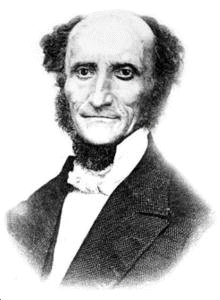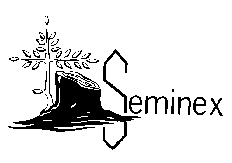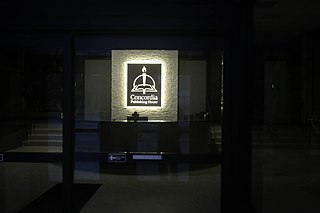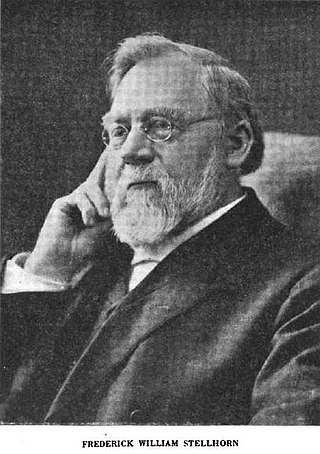
The Lutheran Church – Missouri Synod (LCMS), also known as the Missouri Synod, is an orthodox, traditional, confessional Lutheran denomination in the United States. With 1.8 million members as of 2021, it is the second-largest Lutheran body in the United States, behind the Evangelical Lutheran Church in America. The LCMS was organized in 1847 at a meeting in Chicago, Illinois, as the German Evangelical Lutheran Synod of Missouri, Ohio, and Other States, a name which partially reflected the geographic locations of the founding congregations.

Carl Ferdinand Wilhelm Walther was a German-American Lutheran minister. He was the first president of the Lutheran Church – Missouri Synod (LCMS) and its most influential theologian. He is commemorated by that church on its Calendar of Saints on May 7. He has been described as a man who gave up his homeland for the freedom to speak freely, to believe freely, and to live freely, by emigrating from Germany to the United States.

Concordia Theological Seminary is a Lutheran seminary in Fort Wayne, Indiana. It offers professional, master's degrees, and doctoral degrees affiliated with training clergy and deaconesses for the Lutheran Church–Missouri Synod (LCMS).

Concordia Seminary is a Lutheran seminary in Clayton, Missouri. The institution's primary mission is to train pastors, deaconesses, missionaries, chaplains, and church leaders for the Lutheran Church–Missouri Synod (LCMS). Founded in 1839, the seminary initially resided in Perry County, Missouri. In 1849, it was moved to St. Louis, and in 1926, the current campus was built.

Seminex is the widely used abbreviation for Concordia Seminary in Exile, which existed from 1974 to 1987 after a schism in the Lutheran Church–Missouri Synod (LCMS). The seminary in exile was formed due to the ongoing Fundamentalist–Modernist Controversy that was dividing Protestant churches in the United States. At issue were foundational disagreements on the authority of Scripture and the role of Christianity. During the 1960s, many clergy and members of the LCMS grew concerned about the direction of education at their flagship seminary, Concordia Seminary, in St. Louis, Missouri. Professors at Concordia Seminary had, in the 1950s and 1960s, begun to utilize the historical-critical method to analyze the Bible rather than the traditional historical-grammatical method that considered scripture to be the inerrant Word of God.

Wilhelm Sihler was a German American Lutheran minister. A proponent for Christian education, Wilhelm Sihler founded Concordia Theological Seminary, in Fort Wayne, Indiana.

Jaroslav Jan Pelikan Jr. was an American scholar of the history of Christianity, Christian theology, and medieval intellectual history at Yale University.

Walter Obare Omwanza is the former presiding bishop of the Evangelical Lutheran Church in Kenya (ELCK), which is a member of the Lutheran World Federation and the International Lutheran Council.

Concordia Publishing House (CPH), founded in 1869, is the official publishing arm of the Lutheran Church–Missouri Synod (LCMS). Headquartered in St Louis, Missouri, at 3558 S. Jefferson Avenue, CPH publishes the synod's official monthly magazine, The Lutheran Witness, and the synod's hymnals, including The Lutheran Hymnal (1941), Lutheran Worship (1982), and Lutheran Service Book (2006). It publishes a wide range of resources for churches, schools, and homes and is the publisher of the world's most widely circulated daily devotional resource, Portals of Prayer. Its children's books, known as Arch Books, have been published in millions of copies. Concordia Publishing House is the oldest publishing company west of the Mississippi River and the world's largest distinctly Lutheran publishing house.

Ben Witherington III is an American Wesleyan-Arminian New Testament scholar. Witherington is Professor of New Testament Interpretation at Asbury Theological Seminary, a Wesleyan-Holiness seminary in Wilmore, Kentucky, and an ordained pastor in the United Methodist Church.
Martin H. Franzmann was an American Lutheran clergyman and theologian. He was also a college professor and poet who wrote numerous books and hymns.
Terence E. Fretheim was an Old Testament scholar and the Elva B. Lovell professor of Old Testament at Luther Seminary. His writings have played a major part in the development of process theology and open theism.

Robert David Preus was an American Lutheran pastor, professor, author, and seminary president.
Joel D. Heck is a retired pastor and professor, formerly Executive Editor of Concordia University Press. He is the author or editor of sixteen books, most recently publishing No Ordinary People: Twenty-One Friendships of C. S. Lewis. He currently serves as Interim President of Concordia Lutheran Seminary in Edmonton, Alberta, Canada.
Robert Harry Smith was a Lutheran clergyman, theologian, prolific author and lecturer on the Bible's New Testament, and dean of a Lutheran seminary in exile in the early 1980s. Smith was one of 40 faculty members from the Lutheran Church–Missouri Synod's Concordia Seminary in St. Louis, Missouri who walked out in 1974 in a theological dispute that ended with the ousting of Concordia's president, John Tietjen, who disagreed with a literal reading of the Bible.
Andrew E. Steinmann was Distinguished Professor of Theology and Hebrew at Concordia University Chicago. He has authored twenty books and numerous articles relating to Old Testament/Hebrew Bible, Biblical Hebrew, and Biblical Aramaic. His publications include books on the Old Testament canon, biblical chronology, Hebrew and Aramaic grammar, and commentaries on several Old Testament books. He retired from teaching in 2023.
Ralph Walter Klein was an American Old Testament scholar. He was Christ Seminary-Seminex Professor Emeritus of Old Testament at the Lutheran School of Theology at Chicago.
Devadasan Nithya Premnath, known as D. N. Premnath, is an Indian pastor and Old Testament scholar, who has been teaching since 1988 at the St. Bernard's School of Theology and Ministry, a Roman Catholic seminary, in Rochester, New York. In 1981, Premnath participated in an archaeological dig at Tell el-Hesi in southern Israel.

Frederick William Stellhorn, an American Lutheran theologian, was born in Brüninghorstedt, a community in Warmsen the Landkreis of Hannover, in Lower Saxony (Niedersachsen), Germany.
John Hall Elliott was an American biblical scholar and professor emeritus of Theology and Religious Studies at the University of San Francisco. A founding member of the Context Group, his scholarship and teaching examine the Bible through interdisciplinary, cross-cultural and ecumenical lenses.










